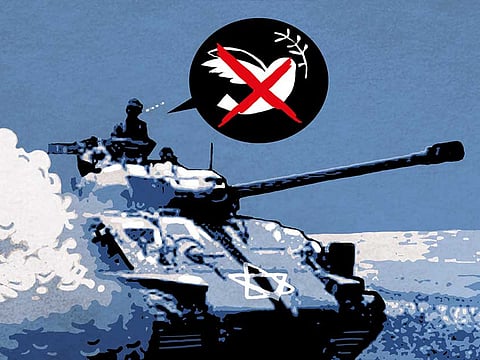Crucial lessons from the 1967 War
Arabs must study the conflict and an enemy not interested in peace, if they want to avoid another devastating war

As Arabs we owe it to ourselves not only to know what happened 50 years ago but how it happened, for the numbers simply don’t add up. One country against at least three, the strategic planning, military coordination, thinking behind another war, the Israeli mentality versus the Arab one...
What were Israeli leaders thinking after the 1948 disaster and the 1956 tripartite attack on Egypt? These are just some of the questions Arab thinkers, strategic planners, politicians, and even the man on the street, should be thinking out loud as we remember the devastating Arab-Israeli War that occurred on June 5, 1967 and ended six days later.
We are still at point zero — nothing has changed. The Arab-Israeli peace process launched in Madrid in 1991 and the subsequent Oslo process of 1993 are in the doldrums thanks to Israeli intransigence.
Nearly 24 years later, today, the Palestinian lot on the West Bank and Gaza is nowhere near to being liberated but continues to reel under a chequered peace process under the thumb of the Israeli occupation. Israel continues to pay lip service to peace negotiations while blaming the Palestinian side for foot-dragging and being unwilling to make concessions on land and territory it has occupied since 1967 and before.
Because we are at a stalemate, we need to go back to the June 1967 Arab-Israel War and the subsequent Israeli land grab of Palestinian and Arab lands and territories, to which it quickly established an occupation regime over and whose knuckles are born, orchestrated and executed by the Israeli military and army.
Dissecting those gruelling days
We need to think aloud how this has happened, how it continues to happen and what our future is. How can we move forward in the presence of an Israeli juggernaut effectively ruling civilian Arab populations? We need to stretch our minds further and dissect these gruelling days of that bloody war that resulted in greater Arab territorial losses and Israeli land grabs, when the carpet was literally pulled from under our feet and we lost exceedingly more territory than we could have possibly imagined, and where the regional situation was turned upside down with more Palestinian refugees.
The 1967 war stands out as a sore thumb in the history of Israeli-Arab relations. In just six days, the West Bank and Gaza Strip fell, Jerusalem was occupied and shortly after annexed, the Sinai Peninsula was taken and the Golan Heights captured by Israel.
Throughout its land grab, Israel increased what is termed as its strategic security depth in the West Bank, which it occupied before forcing out over 300,000 more Palestinian refugees who mostly fled to Jordan. For many it was a repeat of the 1948 Catastrophe that saw the emergence of over 700,000 refugees.
In the West Bank and Gaza, Israel came to rule over 1.2 million people and for the first time it controlled the Golan Heights and set about encouraging the removal of 100,000 members of the existing population. Like the West Bank, Israel set upon peppering the Golan Heights with Israeli colonies as it expanded its reach.
While Egyptian President Jamal Abdul Nasser, whose planes were destroyed while on the airfield on June 5, 1967, branded the 1967 War ‘Al Naksa’ (a setback) — a term purposely used to mean a delay in liberating the lost Palestinian territories — it was definitely much more than that.
To call the Israeli land grab a setback is no doubt a huge understatement and a malaise in the Arab political dictionary. The term needs, first of all, to be berated, chastised and vilified. It also need to be re-evaluated, re-examined, rectified and simply thrown out of our narrative, collective memory and consciousness.
The 1967 June War, semantically referred to by Arabs in a nonchalant way, takes a more precise meaning on the part of Israelis when they simply use the term, the Six-Day War, to underline the lucidity of the term. For them, the war was destructive and swift; an unmitigated disaster on a mass scale that can arguably be equalled to the 1948 disaster when Palestine fell to the Jews.
It was a defeat also for Arab countries and their regional order that once again showed their incapability to protect, not only Palestine, a good portion of which fell from the map 20 years earlier, but their territories and made them vulnerable. A good case in point is Lebanon, which from the 1970s onwards was seen as Israel’s backyard to invade nilly-willy.
Lebanon was indeed part of the hazy regional order that emerged after 1967, the short war that put Israel in the driving seat to dictate the unfolding of events in the region and to pussyfoot on important issues, like the peace process, and to send Arabs, Palestinians and other countries across the world on a wild-goose chase about its ultraism for peace negotiations — something to which it finds the flimsiest of excuses to get out of.
That is why Arabs need to study the June War of 1967 to be able come out with a meaningful methodical paradigm for their losses. They need to study it to be able to deal with an enemy that has no interest in peace but must be brought to the negotiating table to avoid the slippery-slope of another devastating war.
But maybe these are its real intentions.
Marwan Asmar is a commentator based in Amman. He has long worked in journalism and has a PhD in Political Science from Leeds University in the UK.



